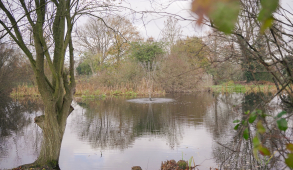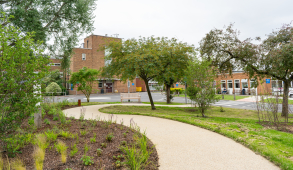Comment / Healthy ecosystems, healthy populations
Climate change has already had a significant impact globally and the NHS is on a journey to meet ambitious national targets to reduce its own contribution to carbon emissions. At Royal Brompton and Harefield Hospitals, we’re playing our part, with a plan to minimise our own impact on the environment in line with NHS targets. One area that we are able to focus on is biodiversity.
We are fortunate to have extensive grounds in Harefield (north-west London), that until the 1960s, was used to care for patients recovering from tuberculosis. Patients helped to grow food and tended for nature as part of their therapy and rehabilitation.
With 11 hectares of green space, Harefield Hospital is in a conservation area within London’s green belt, and its historical architectural design allows us to maximise outdoor spaces for the benefit of our patients as well as the environment. Harefield’s critical care unit also enjoys a dedicated sun therapy area that overlooks a garden and is fitted with an oxygen supply, so even very unwell patients can spend some time outside. This facility has made a positive impact on patients’ mood and quality of sleep.
One patient, Paul, recently reflected on spending five hours in the area. ‘I fell asleep,’ he said. ‘Just being out in fresh air after being stuck inside for so long was amazing. I remember going outside for the first time and smelling the plants and the trees. Just normal smells. It helps break the day as they can be so long. It gives you the freedom to feel normal. I’d say it improved my health. I went out as much as I could.’
The sun therapy area is one of many where patients and staff can enjoy the outside world at Harefield Hospital. Over the past four years, patients’ relatives and staff have collectively transformed several external under-used sites into havens of peace and tranquillity.
New multi-sensory planting schemes like the Healing Garden have been designed by patients’ relatives to be accessible to those using wheelchairs, and green walks to and around the two lakes are signposted within the hospital’s grounds. Mobile patients report visiting the gardens daily, weather permitting, with all surveyed saying it helps them ‘feel better’. Less mobile patients can also enjoy restorative nature from their window.
Investment into the Harefield gardens, totalling around £350,000, has been funded between 2018 and 2020 by generous donations from a number of sources, including: former patients, families and friends of patients; the Royal Brompton and Harefield Hospitals Charities; Harefield Hospital; Harefield Transplant Club; the Mayor of London Greener City Fund; the National Lottery Community Fund; Hillingdon Council; the HS2 Community Environmental Fund; the Heathrow Community Trust; and local businesses Clancy and Artemis tree surgeons.
Patients, their relatives and carers, and members of staff have all contributed volunteer hours with the estates team to maintain our green spaces – from weeding to planting bulbs and trees. In return, they feel a sense of achievement and learning. One volunteer, who enjoyed a session (led by a community gardener from programme partner Groundwork London), said they learnt new things that they could put into practice in their own garden. ‘There was a good balance of things I already knew, and new information pitched at a level I understood,’ they added.
Caring for health and wellbeing, our own included, has become even more important since the pandemic. Access to nature has been a source of respite for many in times of intense stress. When 79 volunteers planted over 400 tree saplings at Harefield, one member of staff explained how it helped them cope in 2020. ‘Whenever I spend time in natural environments, I get a sense of enormous wellbeing,’ they said. ‘Walking in woodland surrounded by trees and wildlife lifts my spirits and makes me feel happier and more relaxed.’ We recognise that our own good health can be linked to protecting the natural world and enhancing it.
Restoring our natural surroundings at Harefield, and helping it thrive, not only has benefits for the wellbeing of staff and patients, it also has the potential to offer carbon storage opportunities through restorative ecological projects. Working with ecology experts from Brighton University’s Centre for Aquatic Environments, our arts and estates teams are developing a five-year management plan to diversify the types of habitats for wildlife. These in turn become efficient carbon sinks.
Native animal species, fruit trees, woodlands, wetlands, and wildflower meadows all form part of planned developments, which are incorporated into our hospitals’ sustainability plans. We have outlined biodiversity goals alongside targets for areas such as transport, energy, clinical practice, food and waste management, and procurement that will help us reduce our impact on the environment and engage our members.
The importance of nature in health is felt across the NHS at a national level. Inspiring programmes such as Horatio’s Gardens supporting ‘high maintenance’ gardens in spinal injury centres, NHS Forest spanning across over 200 sites, and countless initiatives to turn the ‘grey’ into ‘green’ are funded through charitable giving, in the same way our Harefield Gardens were.
We are noticing change in the financing of programmes too. For example, Green Space for Health, delivered by Centre for Sustainable Healthcare, has been taken forward with Green Recovery Challenge funding from the Department for Environment, Food and Rural Affairs. It supports important projects such as employing a park ranger at our neighbouring hospital Mount Vernon.
The Handbook for nature on prescription to promote mental health, developed by the European Centre for Environment and Human Health at the University of Essex, drew on funds from the Medical Research Council. And GP and medical educationalist Lucy Loveday says it ‘signifies the beginning of an urgent and important paradigm shift in health care’. Green Social Prescribing is one aspect of social prescribing, which is being expanded under the NHS long-term plan, and can help deliver holistic health in the community. Could NHS finances support this shift in clinical settings? We’ll soon find out.
*Royal Brompton and Harefield Hospitals Clinical Group is part of Guy’s and St Thomas’ NHS Foundation Trust
The HFMA’s Environmental Sustainability Special Interest Group has been highlighting good practice on sustainability for a number of years. Coinciding with the United Nations Climate Change Conference (COP26), the association has also made a number of commitments and published green pledges from members alongside new briefings and blogs. See the HFMA’s COP26 outputs here.
Related content
The Institute’s annual costing conference provides the NHS with the latest developments and guidance in NHS costing.
The value masterclass shares examples of organisations and systems that have pursued a value-driven approach and the results they have achieved.